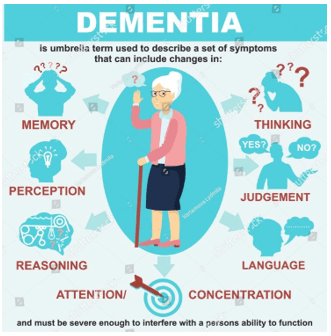A nurse is caring for a client who has dementia.
Which of the following findings should the nurse expect?
Memory loss that disrupts ADLs
Catatonia
Illusions
Pressured speech
The Correct Answer is A
a. Memory loss that disrupts ADLs
Explanation: Dementia is a condition characterized by a decline in cognitive function that affects a person's ability to perform activities of daily living (ADLs). Memory loss is a common symptom of dementia, particularly in the early stages. The memory loss can disrupt a person's ability to carry out tasks they were previously able to do independently, such as dressing, bathing, and eating. Therefore, option a is the correct answer.
Option b, catatonia, is a condition characterized by a lack of movement or activity, which is not typically associated with dementia.
Option c, illusions, involve a misinterpretation of sensory information and may occur in some forms of dementia but are not a defining feature.
Option d, pressured speech, is a symptom commonly associated with mania or bipolar disorder, but is not typically seen in dementia.

Nursing Test Bank
Naxlex Comprehensive Predictor Exams
Related Questions
Correct Answer is C
Explanation
Choice A Reason:
Muscle spasms of the left leg can be uncomfortable and may require interventions such as muscle relaxants or repositioning of the limb, but they do not pose an immediate threat to the client's limb or life.
Choice B Reason:
One fingerbreadth of space between the cast and the skin is an important measurement to ensure that the cast is not too tight, but it does not represent an immediate threat to the client's circulation.
Choice C Reason:
Diminished pulses on the affected extremity. Diminished pulses on the affected extremity, in this case, the left leg with the long leg cast, is the most critical finding that requires immediate attention. It could indicate compromised blood flow, which is a medical emergency. Compromised blood flow can lead to tissue ischemia and necrosis if not promptly addressed.
Choice D Reason:
Ecchymosis (bruising) on the inner left thigh is concerning but may be related to the cast application or other factors. While it should be assessed and monitored, it is not as urgent as diminished pulses.
Correct Answer is A
Explanation
Choice A Reason:
Time of last pain medication is correct. This is important for the oncoming nurse to know to ensure timely pain management for the client.
Choice B Reason:
Preferred bath time is incorrect. While it's important to respect the client's preferences, the timing of their bath is typically not as critical to include in the change-of-shift report, especially when compared to more vital information like medication timing.
Choice C Reason:
Admission vital signs is incorrect. Vital signs taken upon admission are usually documented in the client's chart and are not typically included in change-of-shift reports unless there has been a significant change or concern with the client's vital signs during the shift.
Choice D Reason:
Steps required for dressing change is incorrect. While important for the client's care, the specific steps for a dressing change are typically documented in the client's care plan or orders and may not need to be repeated in every shift report unless there's a specific issue or change in the dressing change procedure.
Whether you are a student looking to ace your exams or a practicing nurse seeking to enhance your expertise , our nursing education contents will empower you with the confidence and competence to make a difference in the lives of patients and become a respected leader in the healthcare field.
Visit Naxlex, invest in your future and unlock endless possibilities with our unparalleled nursing education contents today
Report Wrong Answer on the Current Question
Do you disagree with the answer? If yes, what is your expected answer? Explain.
Kindly be descriptive with the issue you are facing.
